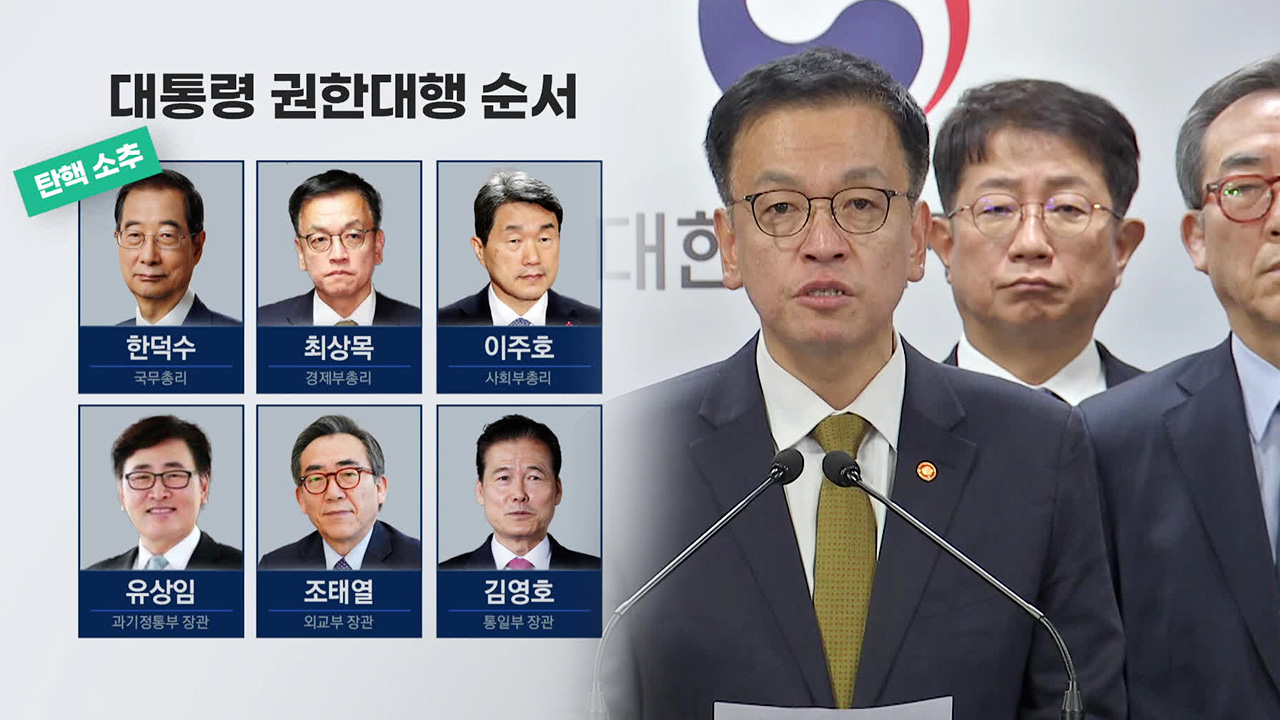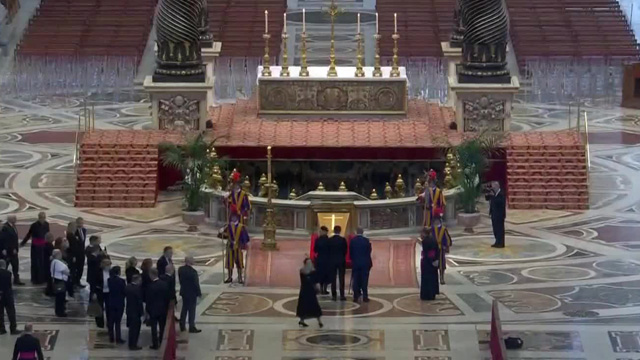Concerns increase of "government paralysis" as impeachments continue
입력 2024.12.28 (22:54)
읽어주기 기능은 크롬기반의
브라우저에서만 사용하실 수 있습니다.
[Anchor]
If the opposition party proceeds with the impeachment of acting President Choi Sang-mok over the issue of appointing constitutional judges, Deputy Prime Minister Lee Ju-ho will take over the duties of acting prime minister.
If five more cabinet members are impeached, including acting President Choi Sang-mok, the government's Cabinet meeting will be rendered ineffective.
This is Jo Hye-jin reporting.
[Report]
Ahead of the vote on the impeachment motion against acting President Han Duck-soo, Cabinet members issued a statement.
[Choi Sang-mok/Acting President/Yesterday: "The ongoing risk of impeachment is stifling the executive branch's capabilities, and ultimately, the reason for the existence of Cabinet members will disappear."]
The core of the government crisis theory is the Cabinet meeting.
The Cabinet meeting is the highest policy deliberation body of our government, and according to the constitution, major national affairs such as bills and budgets must go through Cabinet deliberation.
A quorum of at least 11 out of 21 members, including the president, prime minister, and ministers, is required for deliberation, but currently, only 15 members remain as 6 have vacated their positions due to impeachment.
If the opposition party impeaches acting President Choi as well, the next acting prime minister will be Deputy Prime Minister Lee Ju-ho, and if three more are impeached from there, the cabinet meeting will be rendered ineffective.
Some in the opposition party are already warning of a mass impeachment that could lead to the resignation of the entire Cabinet.
This means that the National Assembly Speaker would directly announce major bills without Cabinet deliberation.
[Jang Young-soo/Professor at Korea University Law School: "The problem is that they want to proceed without (Cabinet meeting deliberation) oversight, and the fact that the Cabinet meeting cannot function means that nothing can be done, leading to a paralysis of governance."]
As the confrontation between the ruling and opposition parties over the appointment of constitutional judges escalates, the political situation remains shrouded in uncertainty.
This is KBS News Jo Hye-jin.
If the opposition party proceeds with the impeachment of acting President Choi Sang-mok over the issue of appointing constitutional judges, Deputy Prime Minister Lee Ju-ho will take over the duties of acting prime minister.
If five more cabinet members are impeached, including acting President Choi Sang-mok, the government's Cabinet meeting will be rendered ineffective.
This is Jo Hye-jin reporting.
[Report]
Ahead of the vote on the impeachment motion against acting President Han Duck-soo, Cabinet members issued a statement.
[Choi Sang-mok/Acting President/Yesterday: "The ongoing risk of impeachment is stifling the executive branch's capabilities, and ultimately, the reason for the existence of Cabinet members will disappear."]
The core of the government crisis theory is the Cabinet meeting.
The Cabinet meeting is the highest policy deliberation body of our government, and according to the constitution, major national affairs such as bills and budgets must go through Cabinet deliberation.
A quorum of at least 11 out of 21 members, including the president, prime minister, and ministers, is required for deliberation, but currently, only 15 members remain as 6 have vacated their positions due to impeachment.
If the opposition party impeaches acting President Choi as well, the next acting prime minister will be Deputy Prime Minister Lee Ju-ho, and if three more are impeached from there, the cabinet meeting will be rendered ineffective.
Some in the opposition party are already warning of a mass impeachment that could lead to the resignation of the entire Cabinet.
This means that the National Assembly Speaker would directly announce major bills without Cabinet deliberation.
[Jang Young-soo/Professor at Korea University Law School: "The problem is that they want to proceed without (Cabinet meeting deliberation) oversight, and the fact that the Cabinet meeting cannot function means that nothing can be done, leading to a paralysis of governance."]
As the confrontation between the ruling and opposition parties over the appointment of constitutional judges escalates, the political situation remains shrouded in uncertainty.
This is KBS News Jo Hye-jin.
■ 제보하기
▷ 카카오톡 : 'KBS제보' 검색, 채널 추가
▷ 전화 : 02-781-1234, 4444
▷ 이메일 : kbs1234@kbs.co.kr
▷ 유튜브, 네이버, 카카오에서도 KBS뉴스를 구독해주세요!
- Concerns increase of "government paralysis" as impeachments continue
-
- 입력 2024-12-28 22:54:02

[Anchor]
If the opposition party proceeds with the impeachment of acting President Choi Sang-mok over the issue of appointing constitutional judges, Deputy Prime Minister Lee Ju-ho will take over the duties of acting prime minister.
If five more cabinet members are impeached, including acting President Choi Sang-mok, the government's Cabinet meeting will be rendered ineffective.
This is Jo Hye-jin reporting.
[Report]
Ahead of the vote on the impeachment motion against acting President Han Duck-soo, Cabinet members issued a statement.
[Choi Sang-mok/Acting President/Yesterday: "The ongoing risk of impeachment is stifling the executive branch's capabilities, and ultimately, the reason for the existence of Cabinet members will disappear."]
The core of the government crisis theory is the Cabinet meeting.
The Cabinet meeting is the highest policy deliberation body of our government, and according to the constitution, major national affairs such as bills and budgets must go through Cabinet deliberation.
A quorum of at least 11 out of 21 members, including the president, prime minister, and ministers, is required for deliberation, but currently, only 15 members remain as 6 have vacated their positions due to impeachment.
If the opposition party impeaches acting President Choi as well, the next acting prime minister will be Deputy Prime Minister Lee Ju-ho, and if three more are impeached from there, the cabinet meeting will be rendered ineffective.
Some in the opposition party are already warning of a mass impeachment that could lead to the resignation of the entire Cabinet.
This means that the National Assembly Speaker would directly announce major bills without Cabinet deliberation.
[Jang Young-soo/Professor at Korea University Law School: "The problem is that they want to proceed without (Cabinet meeting deliberation) oversight, and the fact that the Cabinet meeting cannot function means that nothing can be done, leading to a paralysis of governance."]
As the confrontation between the ruling and opposition parties over the appointment of constitutional judges escalates, the political situation remains shrouded in uncertainty.
This is KBS News Jo Hye-jin.
If the opposition party proceeds with the impeachment of acting President Choi Sang-mok over the issue of appointing constitutional judges, Deputy Prime Minister Lee Ju-ho will take over the duties of acting prime minister.
If five more cabinet members are impeached, including acting President Choi Sang-mok, the government's Cabinet meeting will be rendered ineffective.
This is Jo Hye-jin reporting.
[Report]
Ahead of the vote on the impeachment motion against acting President Han Duck-soo, Cabinet members issued a statement.
[Choi Sang-mok/Acting President/Yesterday: "The ongoing risk of impeachment is stifling the executive branch's capabilities, and ultimately, the reason for the existence of Cabinet members will disappear."]
The core of the government crisis theory is the Cabinet meeting.
The Cabinet meeting is the highest policy deliberation body of our government, and according to the constitution, major national affairs such as bills and budgets must go through Cabinet deliberation.
A quorum of at least 11 out of 21 members, including the president, prime minister, and ministers, is required for deliberation, but currently, only 15 members remain as 6 have vacated their positions due to impeachment.
If the opposition party impeaches acting President Choi as well, the next acting prime minister will be Deputy Prime Minister Lee Ju-ho, and if three more are impeached from there, the cabinet meeting will be rendered ineffective.
Some in the opposition party are already warning of a mass impeachment that could lead to the resignation of the entire Cabinet.
This means that the National Assembly Speaker would directly announce major bills without Cabinet deliberation.
[Jang Young-soo/Professor at Korea University Law School: "The problem is that they want to proceed without (Cabinet meeting deliberation) oversight, and the fact that the Cabinet meeting cannot function means that nothing can be done, leading to a paralysis of governance."]
As the confrontation between the ruling and opposition parties over the appointment of constitutional judges escalates, the political situation remains shrouded in uncertainty.
This is KBS News Jo Hye-jin.
-
-

조혜진 기자 jin2@kbs.co.kr
조혜진 기자의 기사 모음
-
이 기사가 좋으셨다면
-
좋아요
0
-
응원해요
0
-
후속 원해요
0










![[속보] 이재명, 민주당 호남 경선서 88.69%로 1위…충청보다 득표율 높아](/data/layer/904/2025/04/20250426_yKnEKN.jpg)




이 기사에 대한 의견을 남겨주세요.